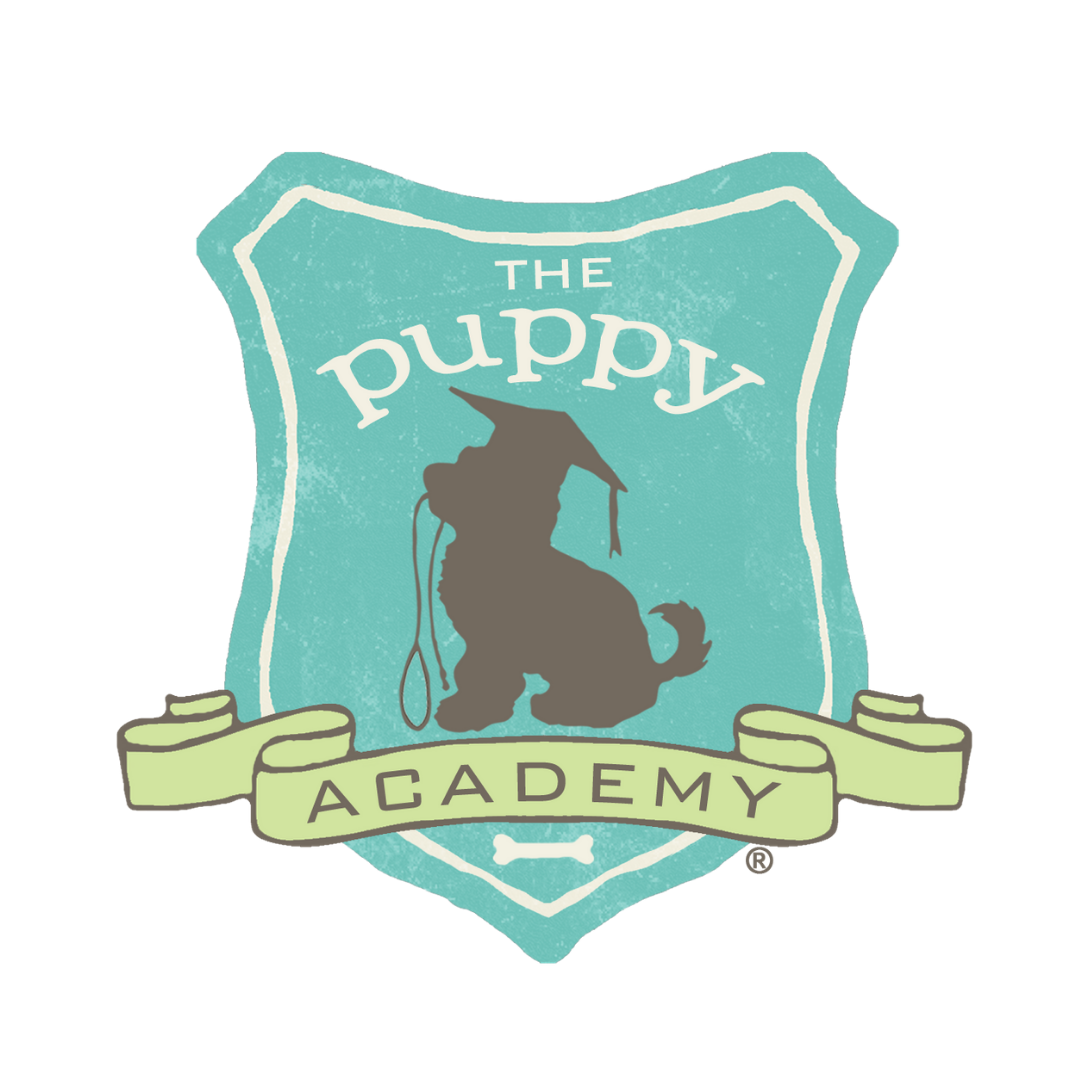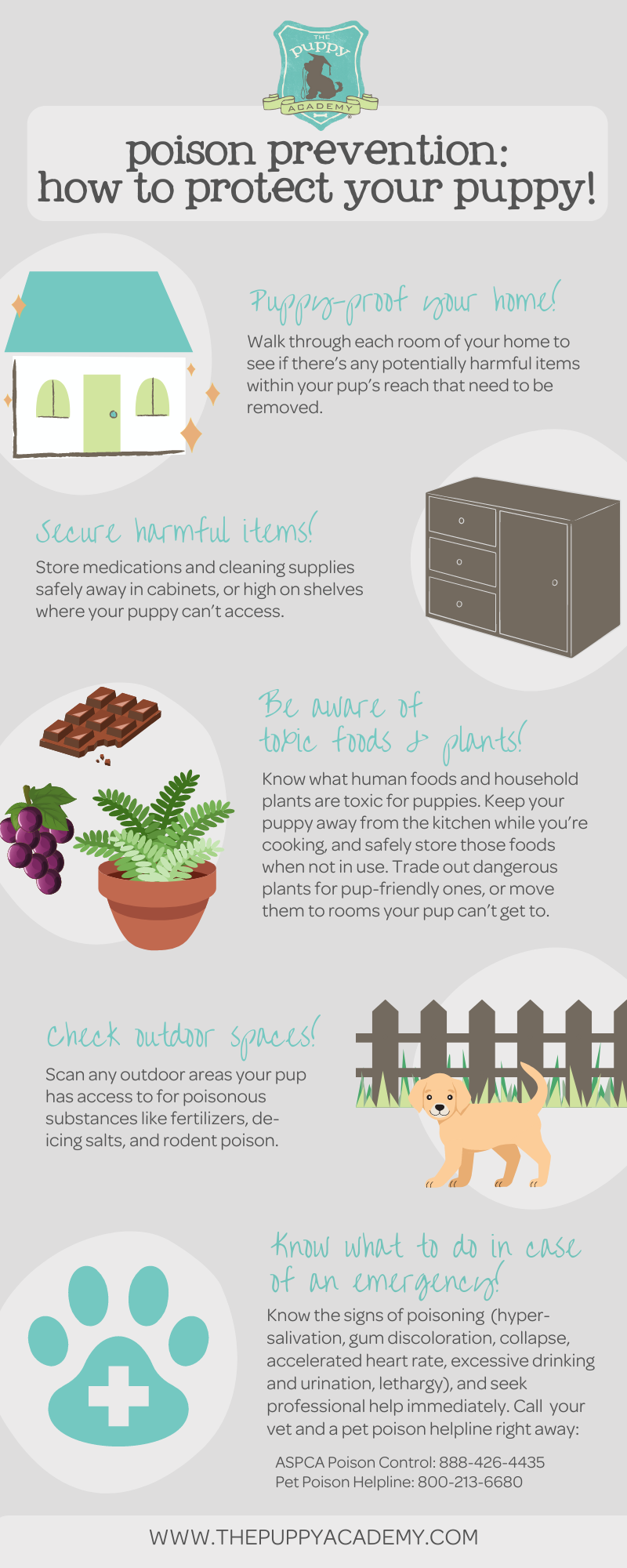We love our pups and want to keep them happy and healthy. While we want to think our homes are perfectly safe, you may not know that certain household items could be potentially poisonous to your puppy! March is Poison Prevention Awareness month and we want to help you prepare and keep your four-legged best friend safe.
Our puppies love to play and get into all sorts of things they probably shouldn’t be! We stress to all of our students’ parents that the best ways to keep their puppy out of trouble or harm is to monitor them during playtime, create appropriate boundaries in different areas of the home with gates, and when supervision isn’t possible, place their puppy in their crate. However, even with all these factors in place, there could be a chance that your puppy could encounter substances or items in your home that could be harmful to them! Prevention is key but you need to learn what to look out for and what steps you need to take to insure your home is safe for your puppy. And of course, how to prepare in the event your puppy does ingest something harmful. Here are some guidelines to follow and always make sure to check in with professionals like your vet and animal poison control experts when dealing with medical situations.
When you prepare your home for your puppy’s arrival or even if your puppy is already home with you, take time to check certain areas of your home for the things we’ll cover later on in the blog. And in the event you suspect a potential poisoning, we’ll walk through the action steps to take immediately!
Please note: the items we’ve put together in this blog are not a complete list for each category, but a smaller group of some of the most common potentially harmful items for a puppy. We encourage you to do your due diligence in order to ensure your pup's utmost safety and wellbeing.
DON’T FORGET TO JOIN US EVERY WEDNESDAY AT 1 PM PT FOR “ASK A PUPPY TRAINER!” LIVE ON @THEPUPPYACADEMY INSTAGRAM!
What to look out for!
When you are bringing home your puppy, you’ll want to go through and identify potentially harmful items when puppy-proofing. Even if you already have your puppy at home, you can puppy-proof at any time following the guide below! Here are some of the common household items found throughout your home you may or may not know about!
Please note: the items we’ve put together in this blog are not a complete list for each category, but a smaller group of some of the most common potentially harmful items for a puppy. We encourage you to do your due diligence in order to ensure your pup's utmost safety and wellbeing.
Kitchen
Probably one of the places in your home your puppy may spend a lot of their time! As a starting off point, look through your kitchen to ensure these items are either out of your puppy’s reach or locked in a cabinet:
Chocolate
Avocado
Onions
Garlic
Candy, Gum (Anything that contains Xylitol)
Grapes
Raisins
Alcohol
Yeast
Caffeine
Macadamia Nuts
Mushrooms
Cleaning supplies (dish detergent, multi-surface cleaners)
Some pups are super curious by all the food smells and could easily figure out a way to get into the garbage. A general rule is to always make sure that your garbage is secure, closed tightly, or out of your puppy’s reach!
Bathroom
Next, check through your bathroom for these items to make sure they are out of reach for your puppy or locked up. The best way to ensure that your puppy doesn’t gain access to items like the ones listed below is by keeping the bathroom doors closed. However, having these items stored safely in the event your puppy does wander into the bathroom will guarantee their safety!
Bleach
Laundry Detergent
Hand sanitizer
Medications
Over-the-counter drugs (Tylenol, Advil, Sudafed, Aspirin, etc.)
Medical Marijuana
Yard or Outdoor Area
Items that we use to treat our lawns and gardens, even some for cutting flowers, can be harmful to your puppy! Supervision outdoors, especially if your puppy still hasn’t learned Recall commands, is highly recommended every time your puppy is playing outside. Keep your puppy away from:
Fertilizer
Lily
Tulips
Daffodils
Foxglove
Azalea
Palm
Rat Poison
De-ice salts
Slug bait
Household Plants
We may think they are pretty and harmless, but if ingested, some of these everyday household plants can cause serious illness for your puppy:
Aloe vera
Ivy
Jade
Dumb cane
Philodendron
Pathos
Sago palm
ZZ plant
Elephant ear
Corn plant
Asparagus plant
Desert rose
Bird of paradise
Peace Lily
Chinese evergreen
We recommend that you remove these plants from your home, raise them up higher, or put up gates around them to create a barrier so your puppy cannot get to them.
What to do if you think your puppy is poisoned
We hate to think of the worst, but our puppies can’t tell us if they feel sick so it’s a good idea to know the right information before an emergency takes place! In the event that your puppy does come into contact with or ingests a poison, your best chance at making sure they get the help they need is being able to tell if your puppy is suddenly ill!
Know the signs - Look for sudden changes in your pup’s behavior and bodily functions. Sudden vomiting, diarrhea, and coughing blood are immediate signs that your puppy may have touched or ingested poison and will need attention from a veterinarian. Other signs to look out for that may not be immediately evident include:
Hypersalivation
Gum discoloration or paleness
Collapse
Accelerated heart rate
Excessive water drinking and urination
Lethargy
Identify the toxin - In order to facilitate immediate treatment of your pup, figure out what your puppy came into contact with or ingested. Then, try to determine how much they ate or touched. If possible, bring the item (if it’s in a package) with you to show the vet.
Seek Help Immediately - Bring your puppy to their vet or an emergency vet clinic. Give them a call before you drive in or on the way if you are able to! This way, you can tell them what your puppy is experiencing and help them to prepare for your pup and provide immediate treatment upon arrival. And most importantly, if you know your puppy came into contact or ingested something, don’t wait for the symptoms to start, rather take them to get treatment immediately.
Depending on the type of poisoning, some veterinarians may ask you to induce vomiting at home with Hydrogen Peroxide. Don’t try this without speaking with your vet or a professional care provider first. If your pup touched a toxin, the vet may ask you to bathe them with a grease-cutting soap (such as Dawn dish soap) before coming in to avoid the spread of the poison.
If you need to visit an emergency vet clinic after hours, make sure to bring your puppy’s medical and vaccination records with you if available, and provide them with any medication allergies or past medical history your pup may have.
Pro Tip: With poisoning, time is of the essence! Keep these numbers readily handy in case of emergency as some vet offices may ask you to call and speak with them directly rather than making the trip into the office!
ASPCA Poison Control (888)426-4435
Pet Poison Helpline (800)213-6680
March is National Poison Prevention Awareness month! We wanted to remind all you puppy owners out there that you should definitely do research on pet food brands, medications, plants, cleaning supplies, etc. you have in your home and that your pup may be exposed to. This way you’ll understand what is safe and what should be stored safely. Share these helpful guidelines with other puppy owners you know to help keep not just yours but all four-legged best friends out there safe!
Learn how to puppy-proof your home and more in our Online School!
DON’T FORGET TO JOIN US EVERY WEDNESDAY AT 1 PM PT FOR “ASK A PUPPY TRAINER!” LIVE ON @THEPUPPYACADEMY INSTAGRAM!
Check out these related blogs on puppy training and more!
Complete Puppy Training Schedule by Age!
How to Care for Your Puppy’s Teeth!
A Guide to Puppy Breeds: Bernedoodles!



